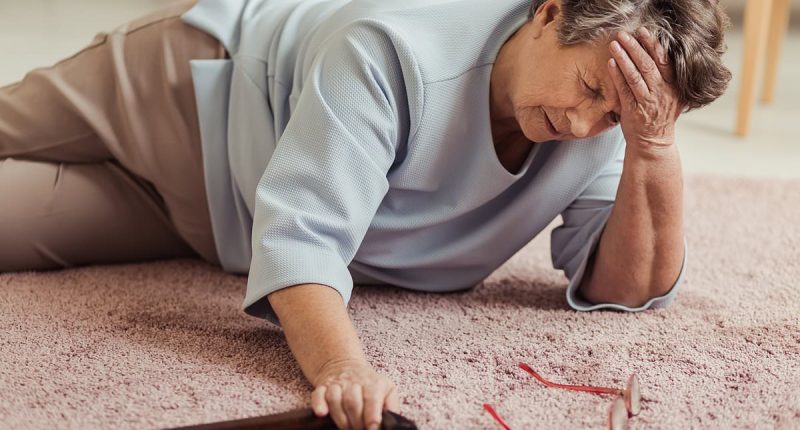Share this @internewscast.com
Elderly people who have a positive attitude towards ageing will recover better if they have a fall, a new study suggests.
Falls in older adults are a ‘major public health concern’ as they can lead to disability and hospitalisation, impacting on people’s ability to live independently, researchers said.
The consequences of falls cost the NHS an estimated £5million a day but the experts noted not every victim experiences physical decline as they set out to investigate whether the impact of a fall could be mitigated by ‘mindsets around ageing’.
The teams from Imperial College London and Coventry University examined information on 694 people aged 60 to 90 in England who had not had a fall in the two years before the study.
As well as studying data on falls, experts also examined survey responses that measured mindsets and beliefs about ageing.
Researchers assessed their walking pace, whether or not they were active and whether they needed help with daily activities, such as dressing, bathing or getting out of bed, after they had a fall.
Those who had initially shown more ‘positive’ ageing mindsets – such as believing that ageing was not stopping them doing what they wanted to do – appeared to have a better recovery after a fall, the academics found.
‘We found that older individuals who had more positive self-perceptions of ageing at baseline were better protected against negative physical consequences following a fall,’ they wrote in the Journal of the American Geriatrics Society.

Elderly people who have a positive attitude towards ageing will recover better if they have a fall, a new study suggests
People who had the highest possible score on the ‘self-perceptions of ageing’ measurements – or having the most positive mindset about ageing – had 162 per cent lower odds of showing slow walking speed, 200 per cent lower odds of being dependent on others to perform daily living activities and were 123 per cent less likely to be inactive following a fall, compared to those who were not positive about ageing.
About one in three people aged 65 years and over have a fall at least once each year, increasing to one in two people aged 80 years and over, according to the National Institute for Health and Care Excellence (Nice).
There are over 210,000 falls-related emergency hospital admissions among people aged 65 years and over each year, with two in three of these among people aged 80 and over.
Previous studies show falls are the main cause of injury, injury-related disability, and death in older people, with around half of falls result in major cuts, traumatic brain injuries, or fractures.
Dr Toby Ellmers, who co-lead the latest research at Imperial College London, said: ‘Those who expressed more positive feelings about their own ageing seemed to be protected against worse physical consequences after a fall.
‘There was substantial difference in the rate of physical recovery in the people we studied, and this seemed to be linked to their initial beliefs about growing older.
‘Our results suggest that changing the way that some older people view their ageing process could play a key role in improving recovery and wellbeing.
‘It’s even possible that simple “tweaks” to help people develop a more positive mindset around ageing, such as having discussions with a friend or relative about the positives associated with ageing, could help.

The consequences of falls cost the NHS an estimated £5million a day
‘This is something we are very keen to explore in future research.’
Fellow co-lead Dr Mathew Hill, from Coventry University, added: ‘Although we knew from previous research that negative mindsets and beliefs about ageing are associated with increased risk of negative health outcomes, such as stroke and mortality, this is the first research linking these specifically to physical recovery after a fall.’












